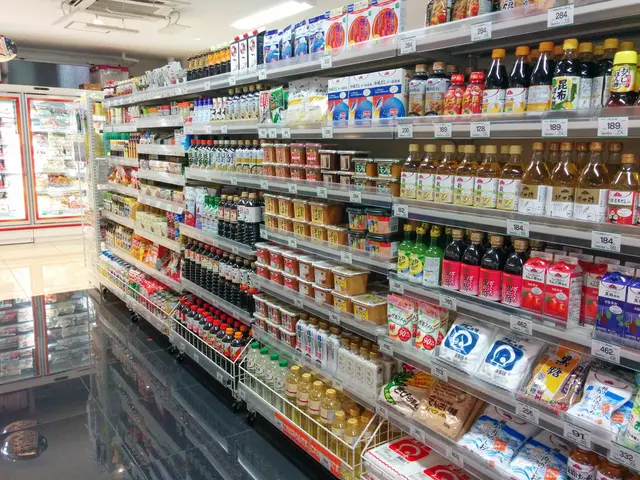Utilizing Blockchain to Propel Environmental Stewardship: An Examination of Its Potential Impact
Digital Dynamo ☁️ Oct 9 2024 by Evelyne Hoffman 🎓 🌻 💸 0 Comments
🔓 Unleashing Blockchain's Potential for Sustainability 🔓
Blockchain technology, the backbone of cryptocurrencies like Bitcoin, is evolving into a game-changer for sustainability across various sectors. Its decentralized, transparent, and secure nature makes it a powerful tool for promoting environmentally responsible and ethical business practices. But why the slow adoption, you ask? Let's delve into it.
A Peek into the Blockchain Tech 👀
At its core, blockchain is a decentralized digital ledger that records transactions across multiple computers (nodes). It eliminates the need for intermediaries by allowing participants to directly interact with each other. key features include:
- Decentralization: Each node holds a copy of the entire transaction history, ensuring security and making blockchain highly resilient.
- Transparency: Every transaction is recorded publicly, providing open insights into business operations.
- Immutability: Once a transaction is recorded, it can't be changed or deleted, ensuring data integrity and trust.
- Consensus Mechanisms: Nodes reach a consensus on transaction validity using methods like Proof of Work (PoW) or Proof of Stake (PoS).
- Smart Contracts: Self-executing contracts automate transactions when predefined conditions are met, improving efficiency.
Businesses across industries, like energy, agriculture, logistics, and finance, can leverage blockchain's transparency and accountability to verify practices, streamline operations, and mitigate risks.
Blockchain Drives Sustainability in Key Sectors 🌱
Blockchain fosters sustainability by providing traceability, accountability, and efficiency across various industries:
- Supply Chain Transparency
- Walmart and IBM's Food Traceability: Blockchain improves food safety by tracking products from farm to store, ensuring sustainable sourcing.
- Everledger: Tracking the lifecycle of diamonds to prevent goods from conflict zones and promote responsible sourcing.
- Energy Sector: Decentralized Energy Trading
- Brooklyn Microgrid: Residents trade excess solar energy, promoting renewable energy use.
- Power Ledger: Peer-to-peer energy trading platform that encourages renewable energy adoption.
- Circular Economy and Waste Management
- Plastic Bank: Incentivizing plastic waste collection by offering tokens for trade.
- CIRCA: Ensuring electronic waste recycling compliance with regulations.
- Carbon Markets
- IBM and Energy Blockchain Lab: Scalable carbon credit trading platform.
- CarbonX: Tokenizing carbon credits for transparent, efficient trading.
- Logistics and Agriculture
- AgriDigital: Streamlined grain supply chain, ensuring sustainable farming practices. -Provenance: Provides consumers with accurate, verifiable product information, fostering trust and promoting fair trade.
- Water Management
- SweetSense and IBM: Monitors groundwater usage for responsible allocation.
- Sustainable Fashion
- LVMH: Traceability and transparency of supply chain to reduce counterfeit goods and support ethical production.
- Fashion for Good and Provenance: Empower consumers with product information to make sustainable choices.
Why Blockchain Still Sits on the Sidelines 🤨
Despite its advantages, several reasons hinder widespread blockchain adoption:
- Lack of Understanding and Awareness
- Frequent association with cryptocurrency makes it difficult for businesses to grasp blockchain's broader applications.
- Scalability Issues
- Proof of Work systems consume high energy resources, slowing adoption in large-scale, high-volume industries.
- Energy Consumption
- High energy requirements can raise environmental concerns, especially in industries prioritizing sustainability.
- Regulatory Uncertainty
- Lacking clear legal frameworks creates uncertainties for businesses adopting blockchain technology.
- Cost and Complexity
- Infrastructure and integration costs can deter smaller organizations from adopting blockchain.
Overcoming Barriers and Capturing the Benefits 💪🏽
Addressing the challenges will allow blockchain to fully unleash its potential for sustainability.
- More Education and Awareness
- Educate businesses and decision-makers about the benefits of blockchain beyond cryptocurrency.
- Scalable Blockchain Solutions
- Develop new blockchain systems, like Proof of Stake, that are more energy-efficient and scalable.
- Clear Regulatory Frameworks
- Governments must establish clear legal frameworks that minimize uncertainties.
- Improve Interoperability
- Collaborate to ensure various blockchain platforms communicate effectively.
- Focus on User Experience and Integration
- Create user-friendly platforms and streamline integration with existing systems.
- Address Centralization Concerns
- Develop decentralized blockchain systems to alleviate concerns about centralization and control.
Blockchain, with its potential to foster sustainability, can reshape industries and create a more transparent, accountable, and eco-friendly future. 🌍💪🏽
[1] CarbonX. (2022). [Accessed 08/23/2022]. https://www.carbonx.io/
[2] IBM. (2021). A Blueprint for Blockchain Supply Chains. [Accessed 08/23/2022]. https://www.ibm.com/blockchain/perspectives/blockchain-supply-chain-blueprint
[3] Everledger. (2021). Interacting with the Web of Provenance –. [Accessed 08/23/2022]. https://www.everledger.io/partners/interacting-with-the-web-of-provenance/
[4] Plastic Bank. (2022). [Accessed 08/23/2022]. https://www.plasticbank.com/
[5] CIRCA. (2022). [Accessed 08/23/2022]. https://www.circasmart.com/
[6] Walmart and IBM Food Trust. (2022). [Accessed 08/23/2022]. https://www.ibm.com/blockchain/solutions/watelligence-network
[7] Power Ledger. (2022). [Accessed 08/23/2022]. https://powerledger.io/
[8] SweetSense and IBM. (2022). [Accessed 08/23/2022]. https://www.ibm.com/blockchain/resources/sweet-sense-kenya-groundwater-monitoring
[9] Fashion for Good and Provenance. (2022). [Accessed 08/23/2022]. https://provenance.org/
[10] AgriDigital. (2022). [Accessed 08/23/2022]. https://www.agridigital.io/
[11] WePower. (2022). [Accessed 08/23/2022]. https://webpower.network/
[12] SolarCoin. (2022). [Accessed 08/23/2022]. https://solarcoin.org/
[13] Maersk and IBM's TradeLens. (2022). [Accessed 08/23/2022]. https://www.tradelens.com/
[14] Energy Web Foundation. (2022). [Accessed 08/23/2022]. https://energyweb.org/#/Overview
- Agriculture can benefit from blockchain technology by promoting sustainable farming practices through streamlined grain supply chains using platforms like AgriDigital.
- Blockchain technology can help enhance the transparency of supply chains, particularly in industries like fashion, ensuring ethical production and reducing counterfeit goods with platforms like LVMH and Fashion for Good.
- The implementation of blockchain technology can result in efficient energy trading, encouraging renewable energy adoption and peer-to-peer energy transactions in programs like the Brooklyn Microgrid and Power Ledger.
- Blockchain can contribute to responsible sourcing and prevent goods from conflict zones by tracking their lifecycle, as demonstrated by Everledger with diamonds.
- Traceable carbon credits trading is made possible through blockchain, allowing for transparent and efficient transactions, as demonstrated by IBM and Energy Blockchain Lab, and CarbonX.
- Blockchain can help manage waste more effectively, such as incentivizing plastic waste collection with platforms like Plastic Bank, or ensuring electronic waste recycling compliance with regulations through CIRCA.
- Water management can be improved with blockchain, as seen with the monitoring of groundwater usage for responsible allocation, demonstrated by SweetSense and IBM.
- Stakeholder relationships in the fashion industry can gain transparency through collaborative efforts, as evidenced by LVMH and Provenance in their efforts to empower consumers.
- Education must be increased to raise awareness about the broader applications of blockchain and to foster its adoption in the business world.
- Developing new blockchain systems, such as Proof of Stake, can help address energy consumption concerns and scalability issues for large-scale industries.
- Governments must establish clear legal frameworks for blockchain to reduce regulatory uncertainties.
- Ensuring various blockchain platforms can communicate effectively is crucial for improving interoperability.
- A user-friendly interface and streamlined integration with existing systems will make blockchain technology more accessible to businesses.
- Addressing concerns about decentralization and control will further encourage the adoption of blockchain technology.
- Innovation in renewable energy, like solar energy, can be optimized with blockchain-based programs like WePower and SolarCoin.
- Blockchain technology can be useful in the logistics industry, as demonstrated by Maersk and IBM's TradeLens in enhancing efficiency and transparency in global trade networks.
- Blockchain's traceability capabilities can be utilized in the food industry, as evidenced by Walmart and IBM's Food Trust, improving food safety by tracking products from farm to store.
- Academia can play a crucial role in promoting blockchain-focused education and research to create the next generation of industry leaders with expertise in environmental-science and sustainability.
- Blockchain's transparency can help promote fair trade in retail, enabling consumers to make informed decisions based on accurate product information, as provided by Provenance.
- Public transit can utilize smart contracts to simplify ticketing systems and enhance the overall passenger experience, increasing efficiency and reducing costs.
- The agricultural sector can benefit from IoT and precision agriculture solutions that integrate with blockchain to optimize crop yields and manage resources more sustainably.
- Blockchain-powered peer-to-peer rental platforms can revolutionize sharing economies, fostering sustainable living by encouraging the re-use of assets.
- Clean technology startups can use blockchain to raise funds and promote responsible resource management, as demonstrated by venture capital investors focusing on cleantech and blockchain.
- Fintech innovations can leverage blockchain to enhance security, streamline cross-border transactions, and enable financial inclusion, particularly in developing countries.
- Real estate transactions can be simplified and made more secure by using blockchain, helping to reduce inefficiencies and legal risks.
- Blockchain-based platforms can enable the secure and transparent verification of personal documents, such as identity and education credentials, fostering trust and streamlining processes in various industries.
- A blockchain-powered infrastructure can support smart cities initiatives, enabling seamless integration of public transit, energy, and transportation systems for a connected and sustainable urban future.
- Blockchain can help promote open access to knowledge, encouraging collaboration and the sharing of resources within the scientific community.
- Blockchain can be useful in improving predictions and decision-making within various industries, including finance, supply chain management, and environmental monitoring, thanks to artificial intelligence and machine learning capabilities.
- Blockchain can help create transparency in the automotive industry by providing detailed information about the lifecycle of vehicles, promoting recycling and the reduction of e-waste.
- Blockchain technology can enhance cybersecurity across various sectors, helping to protect sensitive information and ensuring data privacy and integrity.
- Blockchain can contribute to a more sustainable fashion and beauty industry, as demonstrated by Tonia70's circular fashion platform.
- Energy efficiency in small businesses can be improved through blockchain-based energy management systems that optimize energy usage and promote renewable energy adoption.








